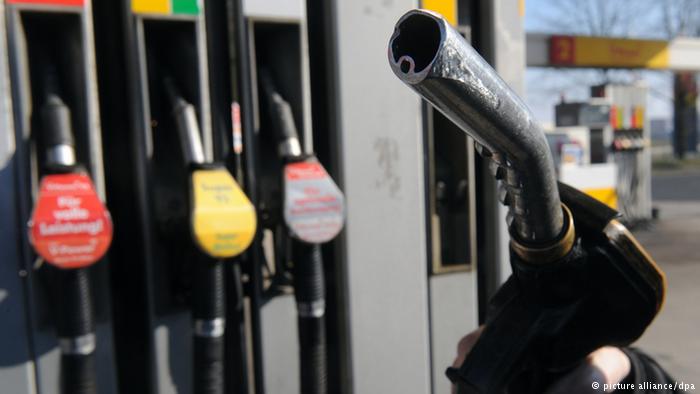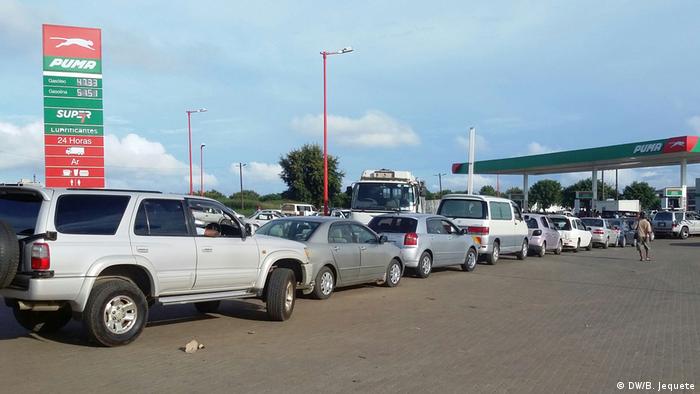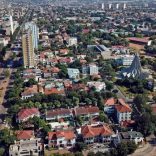Young Mozambican engineers complete technical training in Italy as part of the Coral Sul FLNG ...
Economist defends putting an end to fuel subsidies in Mozambique

DW (File photo)
Hipólito Hamela applauds the end of a system that has “strangled” the country, but says that the government should continue to subsidise public transport and basic products to minimise the impact on family budgets.
The Mozambican Ministry of Mineral Resources and Energy increased fuel prices on Wednesday 22 March. In a press release, the Mozambican government said it would continue “to protect the most needy sectors, including public and private passenger transport, farmers, district power generation and industrial and semi-industrial fishing”.
The government says carriers will continue to benefit from the fuel subsidy and will therefore not have to raise fares. “Currently, the government is subsidizing the fuel price in a generalized way, which does not fit the current reality because of the burden this subsidy represents for the cost structure of the state,” the statement said.
The measure is already being condemned by passenger transport operators who complain of a lack of government support and are threatening to withhold services and increase fares.
But, in an interview with DW Africa, Mozambican economist Hipólito Hamela, a professor at Eduardo Mondlane University, defends the government’s decision, saying that the system “strangles the country”.
DW Africa: Who will pay for these increases in fuel?
Hipólito Hamela (HH): First of all, the increases will affect public transport. And people with lower incomes use public transport. We know that public transport will not change prices, but we also know that semi-collective private transport, the so-called ‘Chapas’, through agreements with municipalities, the Ministry of Transport and provincial directions, will not change the price either tomorrow or the day after, because the price of fuel has changed today. However, they will be affected: their profitability will decrease.
The subsidy system that exists for semi-collective passenger transport is not accessible to many semi-collectives because it requires organised accounting, a company whose governance is sufficiently transparent to be able to negotiate and demand returns from the Ministry of Economy and Finance or the Tax Authority. Very few haulers can do that. They then resort to a route shortening system: even if their route is five kilometres, by which they charged seven meticais, they start to do three and a half kilometres but continue to charge the seven meticais and unload customers half-way. They adjust the operation to the price they previously charged, because they cannot raise prices. (Thus) Rising prices create revolution, leading to strikes and social upheavals.

DW Africa: The government says it will keep the subsidy to this sector. Are we talking about the same subsidy or will the amount be adjusted?
HH: The amount may be adjusted, but the problem is not in the allowance. The subsidy exists, it is well organised, as far as the government is concerned. However, from the cultural point of view, in the Mozambican socio-economic reality or in the business style of our semi-collective transport operators, something has to be done. Something is not right, does not fit, something is not okay.
DW Africa: Will the burden of subsidies on state coffers not be aggravated?
HH: No. Let’s look at myself. I just refilled the car. I worked out what [the price increase] means in the amount I normally used to drive my car for a week and I saw that I lost five litres. The bottom line is that even so, I agree with the increases. The system as it was operating strangled the country. Every time the government had to pay the fuel bill, two or three times a year, the country stopped. The banks were paralysed, the dollars disappeared from the market. This, because the government had to go get the money somewhere, because it would not get it from the final consumers. That was not right.
Personally, agree with me or not, I think the government is doing well to get rid of these subsidies, just as it must get rid of energy and water subsidies. They are distorting the economy. It should keep the subsidies on other basic things that the people need, not on the fuel that the South African, Zimbabwean, Malawian (…) trucks use for international transport. From the economic point of view, we do not have the economy, nor the strength, nor the rating to be able to have this type of subsidies.
DW Africa: From the point of view of family budgets, the measure will have some impact …
HH: That is why it is the localised subsidies have to continue. The subsidy for fuel to public transport must continue. We must continue to subsidise wheat flour, bread, and the basics. It is necessary to reduce the taxes of rice, corn flour. I think that’s where the government has to focus.
DW Africa: The Government says that it is necessary to begin to fully implement fuel legislation, including the revision of retail prices on a monthly basis. Some say that this increase is only the first of several in the coming months. Is it so?
HH: I have no doubt. It was the first time in my life that I heard a member of government say the fuel law should be enforced. Every last Wednesday of the month, fuel prices need to be revised to see if the international price has changed, if the exchange rate – as we import everything – has changed and, as a result, to discuss whether the price of fuel rises or falls. It remains to be seen what will happen when these parameters go down. I want to see if they lower the price. Only in this way will all this be credible.












Leave a Reply
Be the First to Comment!
You must be logged in to post a comment.
You must be logged in to post a comment.